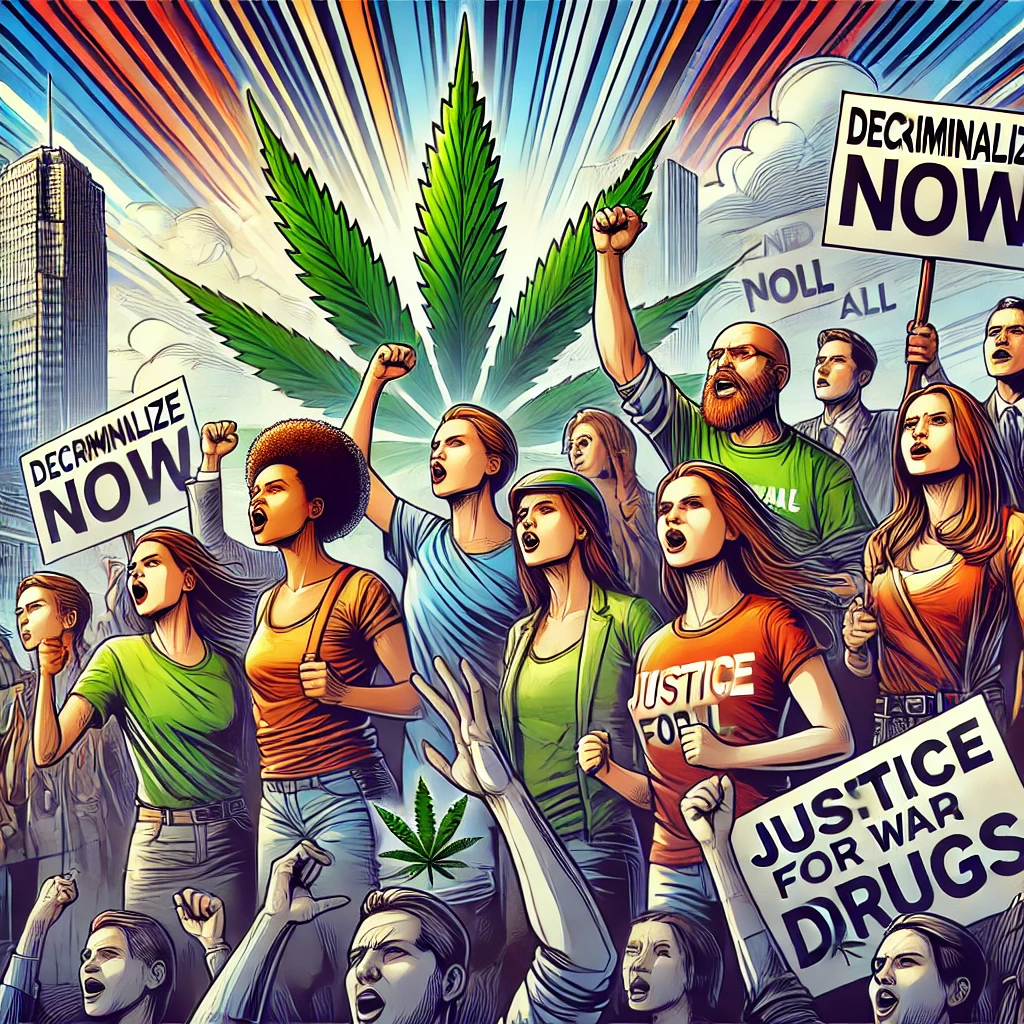In a compelling and well-reasoned plea, nearly 150 social workers have come together to urge President Joe Biden to enact full federal marijuana decriminalization.
“We, members of the social work community, write to issue our firm support for the complete descheduling of marijuana from the Controlled Substances Act (CSA).” the letter begins, ading. “It fails to address the root causes of the harm inflicted on marginalized communities by the war on drugs.”
The letter , penned by some 148 social work professionals, goes on to outline several key reasons why full marijuana decriminalization is essential. First and foremost, it highlights the need to dismantle the structural inequities perpetuated by current drug laws. These laws have disproportionately targeted communities of color, leading to higher incarceration rates and long-term socioeconomic disadvantages. By removing marijuana from the CSA, the federal government would take a significant step towards rectifying these injustices and promoting social equity.
The Impact of Marijuana Decriminalization
The letter highlights the disproportionate impact of marijuana criminalization on Black and Latino communities. Data from the American Civil Liberties Union (ACLU) shows that Black individuals are nearly four times more likely to be arrested for marijuana possession than their white counterparts, despite similar usage rates.
“While communities in legal states can build wealth from legal marijuana sales and benefit from regulations that ensure a safe, unaltered product,” the letter continues, “other communities are subject to losing their homes, their occupations, their families, and their freedom over the same substance.”
Marijuana decriminalization would alleviate many of these issues by removing the legal barriers that hinder individuals’ ability to secure stable employment and housing. It would also reduce the strain on the criminal justice system, allowing law enforcement to focus on more serious crimes and public safety concerns. Moreover, it would help to rebuild trust between law enforcement and the communities they serve, which has been severely eroded by the disproportionate enforcement of drug laws.
Biden’s Marijuana Policies
President Biden has made some strides in addressing marijuana policy, including pardoning federal offenses for simple marijuana possession and initiating a review of marijuana’s classification under the CSA. However, advocates argue that these actions fall short of the comprehensive reform necessary to correct past injustices.
“Rescheduling does not go far enough. It fails to address the root causes of the harm inflicted on marginalized communities by the war on drugs.” says Dr. Carl Hart, a professor of psychology at Columbia University, adding, “Full decriminalization is necessary to truly address the harms caused by prohibition.”
While these policy changes are steps in the right direction, they do not go far enough to dismantle the deeply entrenched systems of inequality perpetuated by marijuana criminalization. Advocates are calling for more robust measures that would not only decriminalize marijuana but also provide reparations and support to those who have been most affected by the war on drugs. This includes expunging past convictions, providing economic opportunities, and ensuring that marginalized communities have access to the legal marijuana market.
The Path Forward
The social workers’ letter calls for a holistic approach to marijuana policy reform. This includes expunging past convictions, investing in communities most affected by the war on drugs, and ensuring equitable access to the legal marijuana market.
“As social workers, we are committed to ensuring families are safe and healthy,” the letter concludes. “Until marijuana is descheduled, the harms of the war on drugs will continue to grow.”
A comprehensive approach to marijuana decriminalization would involve a multifaceted strategy that addresses the root causes of harm. This includes investing in education, job training, and healthcare services for communities that have been disproportionately affected by drug laws. It also means implementing policies that promote economic development and create pathways to wealth and stability for individuals who have been marginalized by the criminal justice system.
The Role of Social Workers
Social workers play a pivotal role in this movement. Their firsthand experience with the repercussions of marijuana criminalization on vulnerable populations gives them unique insights into the real-world impacts. These professionals see daily the consequences of criminal records for marijuana possession: barriers to employment, housing instability, and disrupted education. By advocating for full marijuana decriminalization, they are not only pushing for legal changes but also working towards a more just and equitable society.
Social workers are often on the front lines, providing support and resources to individuals and families affected by drug laws. Their work involves helping people navigate the complex web of social services, advocating for their rights, and connecting them with opportunities for growth and development. By amplifying their voices in the call for marijuana decriminalization, we can ensure that the policies implemented are informed by the lived experiences of those most affected.
The Economic and Social Dimensions
Beyond the immediate legal implications, marijuana decriminalization carries significant economic and social dimensions. Full decriminalization would not only eliminate the legal penalties associated with marijuana use but also open up new economic opportunities for communities historically marginalized by these laws. Legalizing marijuana nationwide would potentially create jobs, stimulate local economies, and generate tax revenue that could be reinvested into communities most impacted by the war on drugs.
Moreover, removing the stigma associated with marijuana use can foster better health outcomes. It encourages open discussions about substance use and allows individuals to seek help without fear of legal repercussions.
In addition to the direct economic benefits, marijuana decriminalization can also lead to broader social improvements. For instance, it can reduce the rates of incarceration and subsequent recidivism, which disproportionately affect people of color and contribute to the breakdown of families and communities. By redirecting resources away from punitive measures and towards supportive services, we can create a more inclusive and equitable society.
Advocacy and Action
The push for full marijuana decriminalization is part of a broader movement toward social justice and equity. Social workers and advocates emphasize that the war on drugs has disproportionately targeted communities of color, leading to long-term social and economic disadvantages. Addressing these historical injustices requires more than surface-level policy changes; it demands a fundamental shift in how society views and regulates marijuana.
The advocacy efforts of social workers and other activists are crucial in maintaining momentum towards meaningful reform. By continuing to raise awareness, engage with policymakers, and mobilize communities, they can help to ensure that the voices of those most affected by marijuana criminalization are heard and that their needs are addressed in any policy changes.
The call for full marijuana decriminalization under federal law is not just about changing a policy—it’s about righting historical wrongs and paving the way for a more equitable future. As social workers and other advocates continue to push for comprehensive reform, their voices highlight the urgent need for a shift that addresses the root causes of harm and promotes social justice. President Biden’s administration has the opportunity to lead this change, ensuring that marijuana decriminalization becomes a cornerstone of a fair and inclusive society.

***
Trap Culture is the ultimate destination for cannabis enthusiasts who want to experience the best of Arizona’s cannabis culture. Whether you are looking for the hottest cannabis-friendly events, the latest cannabis news, trends around industry, or the most exclusive and limited-edition products from the top brands in the market, Trap Culture has you covered. Visit our website to learn more about our events, our blog, and our store. Follow us on social media to stay updated on the latest news and promotions. Join the Trap Culture family and experience the most immersive and engaging cannabis-friendly social events in Arizona.


